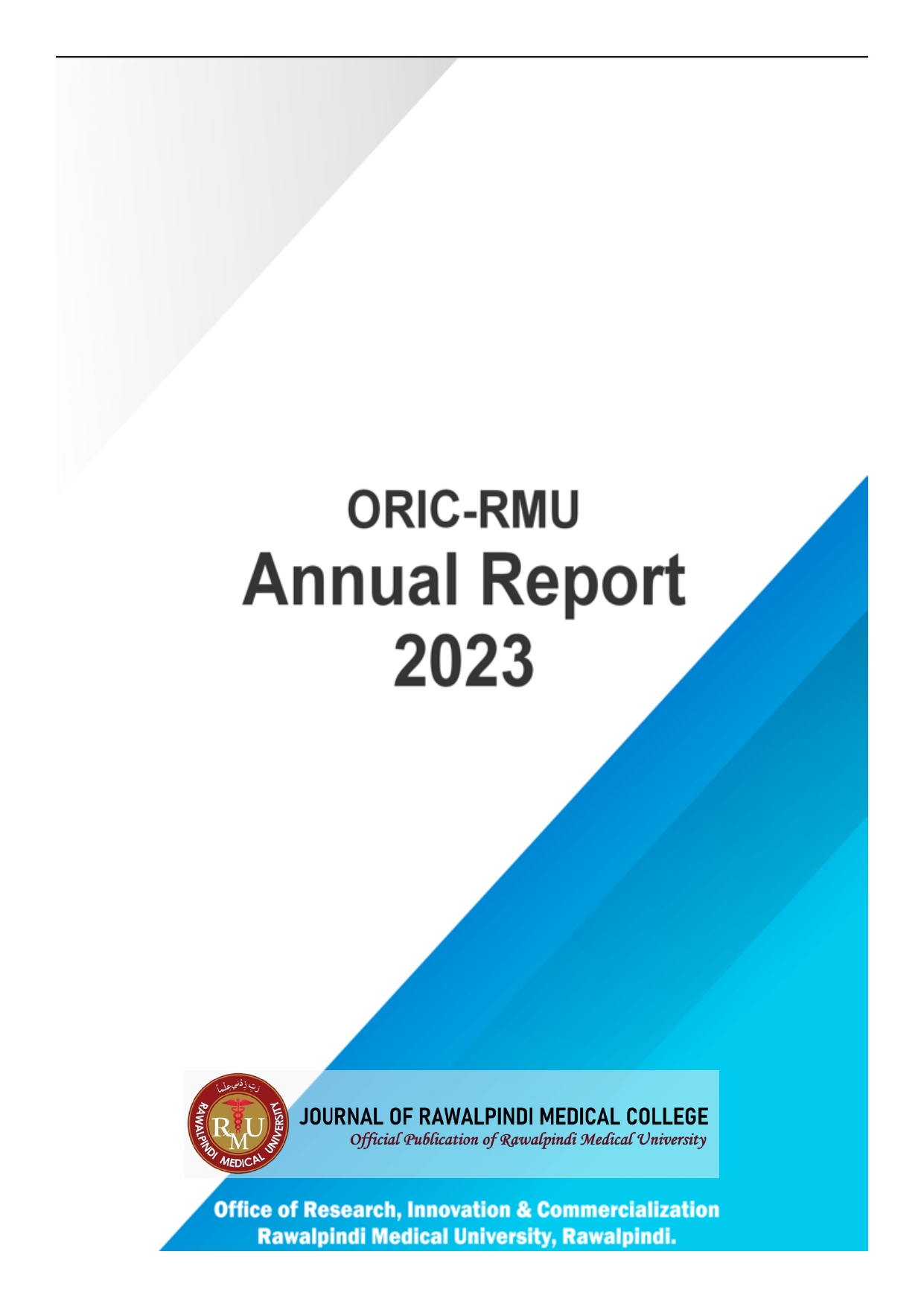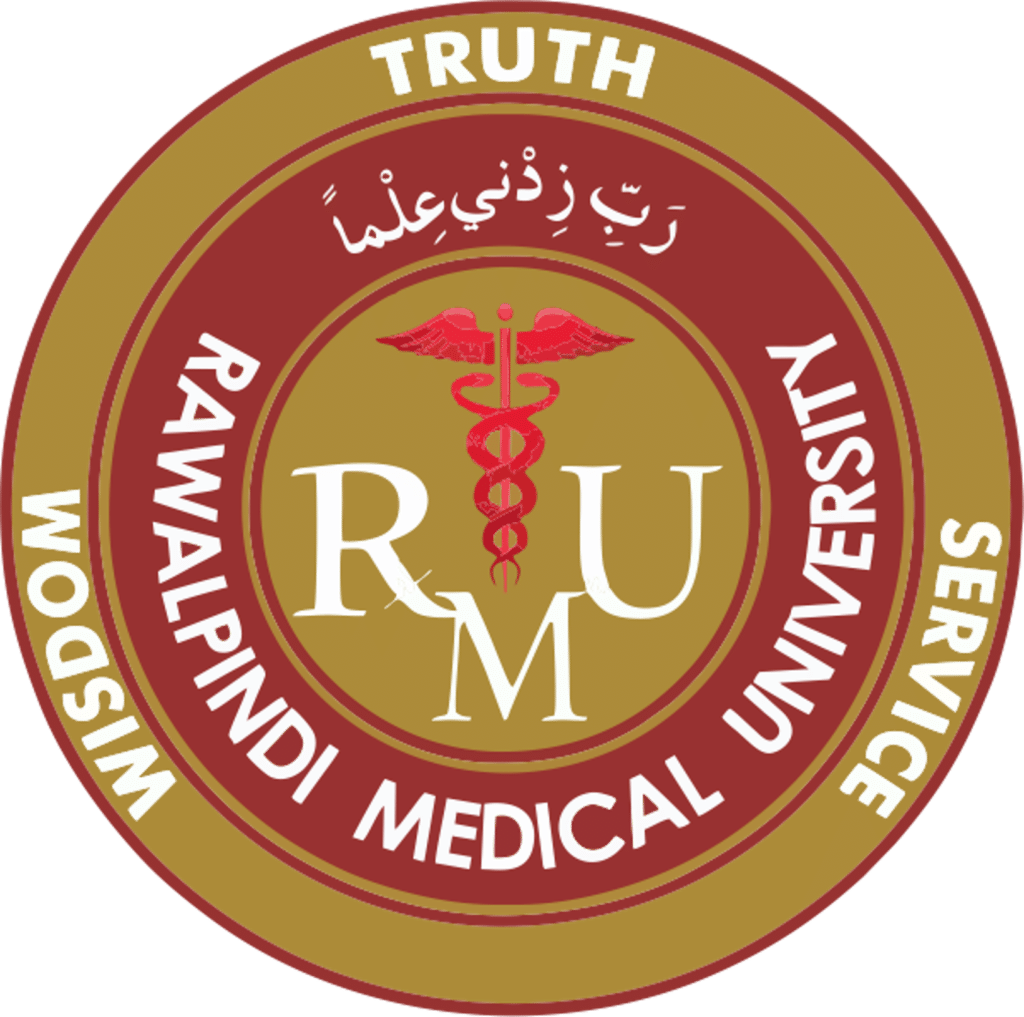
Journal of Rawalpindi Medical College (JRMC)

Collaboration between the Journal of Rawalpindi Medical College (JRMC) and the Research & Development (R&D) Unit of RMU
The Journal of Rawalpindi Medical College (JRMC) proudly collaborates with the Research & Development (R&D) Unit of Rawalpindi Medical University (RMU) in a shared commitment to foster a research-intensive academic environment. This ongoing partnership aims to promote high-quality scholarly output, encourage evidence-based medical writing, and facilitate the dissemination of impactful research at local, national, and international levels.
The R&D Unit of RMU, established to advance research culture within the university, plays a central role in supporting undergraduate, postgraduate, and faculty-led research activities. With its robust infrastructure—including the Clinical Trials Unit (CTU), Research Grant Management Office (RGMO), and experienced faculty in research methodology and biostatistics—the R&D unit provides end-to-end support for the research lifecycle, from proposal development to publication.

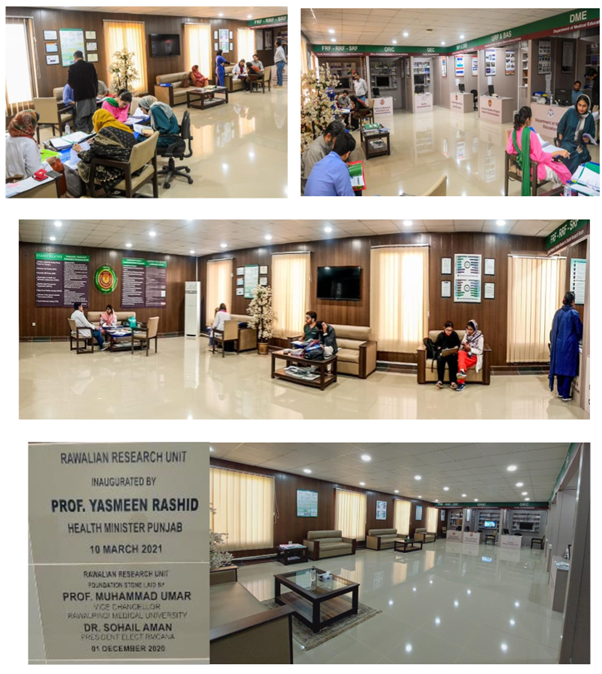
JRMC complements this effort by serving as a key dissemination platform for research conducted at RMU and its affiliated institutions. In line with global publication standards, JRMC prioritizes the publication of research grounded in rigorous methodology and ethical integrity. The journal actively supports the publication of implementation research—a core focus area of RMU R&D—highlighting studies that bridge the gap between scientific evidence and real-world healthcare practices.
Through this collaboration, JRMC also contributes to the professional development of researchers by promoting best practices in scientific writing, adherence to ethical standards, and the responsible conduct of research. Joint initiatives, including workshops, training sessions, and manuscript development programs, further empower researchers at all levels to engage in meaningful inquiry and knowledge dissemination.
This strategic alliance between JRMC and the R&D Unit reflects Rawalpindi Medical University’s broader vision of becoming a leading center for health research and innovation. Together, the journal and the research wing are committed to advancing the frontiers of medical science and contributing to evidence-informed policy and practice in Pakistan and beyond.
Key Research and Developmental Projects
JRMC and the RMU Patient Data Centre: Advancing Evidence-Based Research
The Journal of Rawalpindi Medical College (JRMC) proudly benefits from an active collaboration with the Patient Data Centre at the Research & Development (R&D) Department of Rawalpindi Medical University (RMU). This partnership provides a robust, structured, and ethically governed data resource that empowers researchers to conduct meaningful, evidence-based studies rooted in real-world clinical insights.
Housed within a purpose-built facility at RMU, the Data Centre serves as a cornerstone for academic research, clinical innovation, and educational advancement. It systematically collects, stores, and manages an extensive repository of patient records, enabling faculty, residents, and students to conduct in-depth analyses across a wide range of medical disciplines.
This centralized data resource supports JRMC’s mission in multiple dimensions:
- Publishing Outcomes of Implementation Research: By utilizing longitudinal and cross-sectional data housed at the centre, researchers can generate high-impact findings related to healthcare practices, systems, and outcomes—contributing to JRMC’s growing portfolio of implementation science publications.
- Encouraging Evidence-Based Writing and Publication Ethics: Access to high-quality, real-time patient data enhances the scientific rigor of manuscripts submitted to JRMC. It also reinforces ethical research practices, including adherence to data protection, consent protocols, and responsible authorship.
- Serving as a Dissemination Platform for Collaborative and Funded Research Projects: JRMC serves as the official outlet for disseminating research emerging from collaborative projects, funded trials, and quality improvement initiatives that utilize the RMU Data Centre. This includes research on priority areas such as dengue, hepatitis, diabetes, and other public health concerns catalogued in RMU’s disease-specific data directories.
Key functions of the RMU Patient Data Centre include:
- A comprehensive data repository covering diverse demographics, diseases, and treatment modalities.
- Facilitation of precision medicine by enabling stratified analysis based on genetic and clinical markers.
- Support for clinical trials, from patient recruitment to outcome analysis.
- Backing for quality improvement projects across RMU and its allied hospitals.
- A platform for multidisciplinary collaboration, fostering cross-sector innovation between clinicians, researchers, educators, and data scientists.
Moreover, the centre operates under stringent data governance policies, including a dedicated Plagiarism Policy, Data Management and Protection Policy, and a comprehensive Plan for MS-MD Research, ensuring the integrity, security, and responsible use of all data.
Through this strategic integration, JRMC and the RMU Data Centre are together driving a culture of data-informed inquiry, research excellence, and healthcare innovation—amplifying the university’s impact on both national and global stages.


Statistical Support Services in Collaboration with the Department of Research & Development
The Journal of Rawalpindi Medical College (JRMC), in collaboration with the Department of Research & Development (R&D) at Rawalpindi Medical University, offers comprehensive statistical support to researchers and postgraduate trainees. These services encompass study design consultation, including guidance on methodology, sample size calculation, and appropriate study types; statistical analysis planning, ensuring selection of relevant tests and models aligned with research objectives; and data management support to uphold data accuracy and integrity. The department also conducts training sessions in SPSS and Microsoft Excel/Office 365, enhancing trainees’ data analysis capabilities. Further assistance includes data analysis, interpretation of statistical outcomes, and verification of research data via the RMU Research Dashboard. Regular workshops and seminars, particularly on SPSS and Disease Statistical Reporting (DSR), are also organized for MS/MD trainees. Moreover, the R&D Department actively engages in collaborative research, offering expert statistical input to strengthen interdisciplinary projects and improve the quality of scholarly output.
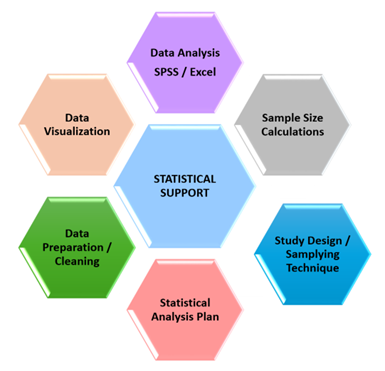
Capacity Building Through Research & Medical Writing Workshops
The Journal of Rawalpindi Medical College (JRMC), in collaboration with the Department of Research & Development (R&D) at Rawalpindi Medical University, is committed to fostering a culture of academic excellence and research integrity. To strengthen the research capacity of postgraduate trainees and faculty members, JRMC and R&D jointly organize a series of structured workshops throughout the academic year. These include four workshops each on “Research Methodology” and “Biostatistics & SPSS” and “Medical Writing & Publishing.” Each workshop is designed to be hands-on and interactive, accommodating 20 to 25 participants to ensure individualized attention and practical learning. The sessions cover essential aspects of research design, data analysis, interpretation, and scientific writing, equipping participants with the necessary skills to conduct and disseminate high-quality research. These workshops play a pivotal role in building foundational competencies, promoting evidence-based practice, and enhancing the overall scholarly output of the university.

JRMC & ORIC
Ongoing Projects
Sr# | Phase | Project Title | Investigator |
|---|---|---|---|
| 1 | PHASE6 | Nutraceutical Synergy in Multi-morbidity Management: Black Seed supplementation for hypertension, diabetes, knee osteoarthritis, and anxiety - a case report | Dr.Asma Umer Khayam, Prof.Dr.Akram Randhawa,Dr Haseeba Tallat |
| 2 | PHASE6 | Mapping the oncological landscape: Insights from the oncology care clinic, Rawalpindi Medical University. | Dr Asma Umer Khayam, Dr Qaiser Aziz, Prof Dr Umar |
| 3 | PHASE6 | Allogenic Stem Cell Transplantation and COVID-19 Antibodies: Mechanistic Insights and Recipient Concerns | Umer, A. , Khayam, A. , Khan, N. , Greene, D. , Habiba, U. and Shamim, S. |
| 4 | PHASE6 | Decoding Dengue: A comprehensive analysis of cases at holy family hospital (2019-2023) and anticipating Pakistan’s future dengue dynamics under climate change | Dr.Saira Karimi, Dr Mujeeb, Dr. Naeem, Prof Dr Umar |
| 5 | PHASE6 | Magnetic Resonance Cholengio Pancreatography (MRCP) Based Diagnosis of Pancreaticobiliary Disorders: Three Years Study at a Tertiary Care Hospital | Dr.Sadia Ahmed, Prof.Dr. Muhammad Umar, Dr. Nasir Khan, Mehwish Iqbal |
| 6 | PHASE6 | A Retrospective Study of Comprehensive Analysis of Clinical Parameters in Chronic Hepatitis C Virus (HCV) Infection | Dr.Asma Umer Khayam, Dr.Saima Ambreen, Prof. Dr. Muhammad Umar |
| 7 | PHASE6 | Revealing ferritin's significance: A prognostic marker in COVID-19 at a tertiary care hospital in Rawalpindi | Kehkshan Jabeen1*, Asma Nafisa1, Wafa Omer1, Mehwish Iqbal1, |
| 8 | PHASE6 | Host immune players and their response to Hepatitis C therapies | Kehkshan Jabeen,Madiha Khlaid, Sajid Mansoor, Ali Zalan, Momina Ejaz, Atika Mansoor, Aneela Javed |
| 9 | PHASE6 | CALHM6: Expression Level in SARS-CoV-2 patients and its trend as the infection progresses | Ali Zalan, Kehkshan Jabeen , Wajid Hussain, Bushra Khan, Muhammad Umar, & Aneela |
| 10 | PHASE6 | Establishment of the Reference Interval of Serum Adenosine Deaminase in the Healthy Adults of Northern Punjab Pakistan | Prof. Dr. Wafa Omer |
| 11 | PHASE6 | Unraveling the Prevalence of Congenital Hypothyroidism in Neonates: A Multi-Hospital Study in Rawalpindi | Prof. Dr Saima Naz / Dr Hina- Paediatric Endocrinology) |
| 12 | PHASE6 | Comparative analysis of CRP and Vitamin D levels:Unreveiling corelations in health parameters | Dr. Mehwish Iqbal/ Prof.Dr.Wafa |
| 13 | PHASE5 | A Clinical Exploration of Black Seed Oil Efficacy in Dermatophytosis: An open-ended Pilot Study. | Prof.Dr.Akram Randhawa/ Dr Asma Umer Khayam/Dr Shawana Sharif |
| 14 | PHASE4 | Development Of Fluorescence Spectral Fingerprints of Bacterial Clinical Isolates For Their Rapid Identification | Dr. Rabia Anjum/ supervisor-Dr Naeem |
| 15 | PHASE3 | Comparing glycemic markers in diabetic patients with iron deficiency glycated albumin versus glycated hemoglobin | Dr. Asma Nafisa |
| 16 | PHASE3 | Effectiveness of pragmatic approach in treating low back pain through real-time data monitoring | Dr. Muhammad Umar |
| 17 | PHASE3 | Environmental Surveillance of Fungi in Intensive Care Units of Tertiary Care Hospital and its Effects on Immunocompromised Patients | Dr. Khuzeema Tanveer/ Prof Naeem |
| 18 | PHASE3 | Development of fluorescence spectra for Rapid Identification of candida species Isolated from High Vaginal Swabs in Antenatal patients | Dr Tehseen Rafaqat |
| 19 | PHASE3 | Unraveling the Influence of Calcium Modulators and ROS Treatment on LRIG Expression during Hepatitis B Virus Infection | Dr.Kehkshan Jabeen/ Prof.Wafa Omer |
| 20 | PHASE1 | Assessing the Anti-hypertensive Interaction between Black Seed and Allopathic Medications: A clinical pilot study | Dr Asma Umer Khayam/ Prof.Dr.Akram Randhawa |
| 21 | PHASE1 | Surveillance of HAI & AMR in Pakistan through IPC and antimicrobial stewardship Programme collaboration with NIH & RMU | Dr Afreenish, |
| 22 | PHASE1 | Assessment of potential health impacts of drinking water quality on academic institutions of Rawalpindi and Islamabad | Dr. Muhammad Ansar Ahmad |
| 23 | PHASE1 | Investigating the potential synergistic effects of Nigella sativa when used in combination with conventional antidiabetic medications | Dr Shanila |
| 24 | PHASE1 | Exploring the relationship between Carcinogenic Heavy metal exposure and Cancer Incidence: A blood based Biomarker study to identify Novel Risk Factors and Potential Therapeutic Targets in Newly Diagnosed Cancer Patients | Dr Haq Nawaz |
| 25 | PHASEx | Assessment of Medicinal Plant Extract-Loaded Electrospun Nanofibers as Natural Antimicrobial Agents for Enhanced Wound Healing in Burn Patients | Dr. Saira Karimi |
| 26 | PHASEx | In Vitro Antifungal Screening of Black Seed Extracts on Dermatophytes Isolated from Clinical samples | Dr Asma Umer Khayam/ Prof.Dr.Akram Randhawa |
| 27 | PHASEx | Molecular Genetic Studies of Autosomal Recessive Cone-Rod Dystrophies (Blindness) | M.A.Faisal Sultan |
| 28 | PHASEx | Genetic and clinical studies for early detection of fatal Lafora disease in Pakistani population: A Case Report | Dr Amna Noor |
| 29 | PHASEx | Pre-Post and Epidemic Communication - Strategies to Improve Patient’s Health Care - Surveillance and Tracking System in Pakistan: An Integrated Model | Dr. Asif / Dr. MAAF Sultan |
| 30 | PHASEx | Multi-Centre epidemiological study on the incidence of hydatid disease in Pakistan | Dr. Imran Yonus |
| 31 | PHASEx | Molecular Assay Development for Rapid Diagnosis of Dengue in Pakistan | Dr Saira Karimi/ Prof. Naeem |
JRMC's Support for Clinical Trial Unit (CTU) at Rawalpindi Medical University: Advancing Research and Clinical Care
JRMC strongly supports the Clinical Trial Unit (CTU) at Rawalpindi Medical University (RMU) in its mission to enhance clinical research and patient care. The CTU, established with a clear focus on conducting safe, efficient clinical trials, aims to provide scientific mentorship, regulatory guidance, and statistical resources to researchers. JRMC collaborates with the CTU to foster the development and implementation of new treatment interventions, ensuring they meet rigorous standards of human safety and efficacy. Through this partnership, RMU is positioning itself at the forefront of clinical research, providing patients with access to new treatment options, either free of cost or at minimal charges. With the backing of a dedicated team and significant funding, the CTU at RMU is committed to advancing the culture of clinical trials in Pakistan, aligning with international standards for clinical research and contributing to the global healthcare community

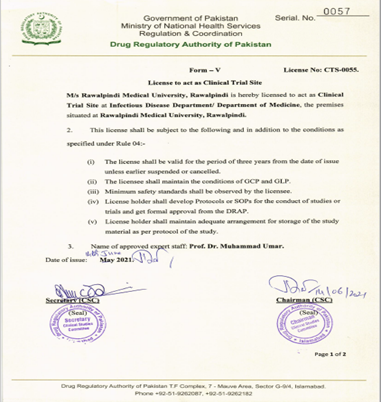

Departmental Clinical Trials Data 2024
JRMC Ethical Support by Institutional Review Board RMU
The Institutional Research Forum of RMU was established by Prof Muhammad Umar, the Vice Chancellor of RMU. Since January 2014 all the research activities of RMU and Allied Hospitals and collaborative research is being facilitated.
Institutional Research Forum meeting is held every month to oversee various aspects of research related activities, their quality assurance, ethical approval and appraisal of all the research studies of all cadres and department of RMU. Any researched intended to conduct research project or data collection at our RMU and Allied Hospitals have to get approval from IRF of RMU.
IRF COMPOSITION
VC Prof. Muhammad Umar
Chairman
Prof. Hamama-Tul-BushraKhaar
Co-Chair
Prof. Shagufta Sial
Member
Prof. Shagufta Sial
Member
Prof. Jahangir Sarwar Khan
Member
Prof. Syed Irfan Ahmed
Member
Prof. Naeem Akhtar
Member
Prof. Mohammad Khurram
Member
Prof. Syed Arshad Sabir
Member
Prof. Asad Tameezuddin
Member
Dr. Ahmed Hassan Ashfaq
Member
Dr. Faiza Aslam
Member
Dr. Hina Mehmood
Member
Dr. Abdul Qudoos
Member
Dr. Uzma Hayat
Liaison Officer IREF (Dy.Dir DME)
Dr. Shazia Zeb
Research Coordinator
Mr. Usman Khalil
Member( community rep)
Mr. Mohammad Tariq
Member legal
Member
Mr.Aamir Afzal
Role of JRMC Editorial Board in Research Oversight and Ethical Governance
The Editorial Board of the Journal of Rawalpindi Medical College (JRMC) plays an active role in the Ethical Review Board (ERB)—also known as the Institutional Research Forum (IRF)—and the Board of Advanced Studies and Research (BASAR) at Rawalpindi Medical University. These bodies collectively ensure rigorous ethical oversight and academic quality of all postgraduate research. As part of the ethical review process, postgraduate trainees are required to first obtain departmental approval for their research proposals, followed by submission to the ERB using the official Research Application Proforma. Each proposal undergoes structured peer review, including a formal presentation at the monthly IRF meeting. Upon ethical clearance, the proposal is further reviewed by BASAR. The approval of BASAR is mandatory prior to data collection, ensuring that all research published or supported by JRMC adheres to the highest standards of academic integrity and ethical compliance.
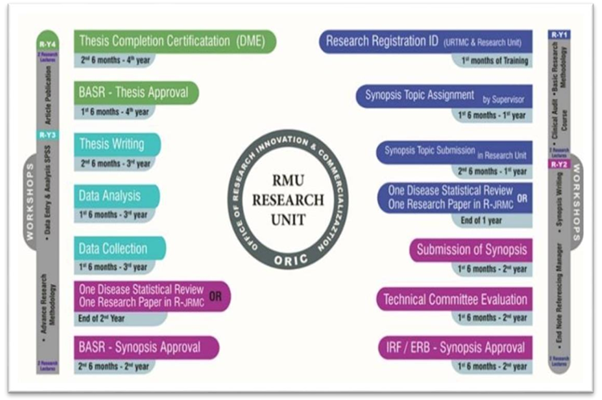



Collaboration for Research and Innovation in Healthcare: JRMC and the Department of AI and Robotics at Rawalpindi Medical University
JRMC actively supports and collaborates with the Department of AI and Robotics at Rawalpindi Medical University to foster research and innovation in the integration of advanced technologies into healthcare. This partnership is focused on equipping medical students with specialized knowledge and hands-on experience in artificial intelligence, robotics, machine learning, and informatics. By seamlessly incorporating AI into medical practice, the department enhances diagnostic accuracy, treatment planning, and patient care, ultimately improving healthcare outcomes. Through ethical AI practices and groundbreaking research, the collaboration aims to drive precision medicine, early disease detection, and personalized treatments, making healthcare more accessible, equitable, and efficient. This strategic alliance between JRMC and the Department of AI is instrumental in transforming Pakistan’s healthcare landscape and preparing future medical professionals to harness the potential of these emerging technologies.
Journal of RMC
- The Journal of Rawalpindi Medical College (JRMC)
- Children Rights Journal of RMC (CrJRMC)
- RMU Journal of Health & Climate Change (JHCC)
- Journal of Nursing & Allied Health (JNAH)
- International Supplement of JRMC (IJRMC)
- Students' Supplement of JRMC (SJRMC)
- Residents' Supplement of JRMC (RJRMC)
- Covid-19 Special Supplement of JRMC
Our Guidelines
Copyright © 2025 Rawalpindi Medical University. All rights are reserved. | The content of this site is intended for health care professionals.
